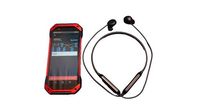In a bid to tackle Japan's growing sleep deprivation crisis, Tsukuba University and Kyocera have collaborated on an innovative system designed to enhance the effectiveness of napping. This new artificial intelligence (AI) technology promises to help users wake up refreshed after a short rest, and verification experiments are set to launch in April 2025.
The AI-powered nap wake-up system, dubbed "sNAPout," employs advanced sensors embedded in earphones to monitor bodily functions during napping. Using Kyocera's specialized laser Doppler blood flow sensors, the system analyzes blood flow rates while individuals nap, ensuring the optimal moment for awakening.
According to a representative from Kyocera, "The napping wake-up AI system 'sNAPout' consists of Kyocera's 'laser Doppler blood flow sensor' embedded in earphones and a smartphone app equipped with AI." This app initiates the napping process, allowing users to listen to soothing sounds that help them drift off.
One of the system's primary functions is to monitor sleep states using the data collected from blood flow analysis. As noted by Masashi Yanagisawa, Director of the International Integrated Sleep Medical Science Research Organization at Tsukuba University, the AI learned to differentiate between various stages of sleep based on classified blood flow metrics. The objective is to wake users only after they have progressed into the lighter stages of sleep, enhancing their wakefulness upon rising.
In addition to the analysis of blood flow, the technology includes an innovative sleep induction method. It leverages sound therapy, playing different frequencies to each ear, which effectively aids users in quickly reaching stage two sleep, an essential phase for restorative rest.
Starting in April 2025, Kyocera plans to kick off verification experiments through paid rentals to corporate clients, aiming to gather data and refine the system's capabilities. The company's future goals include potentially providing this technology to earphone manufacturers for commercialization, a step that could lead to widespread adoption.
The urgency of developing such a system stems from alarming statistics regarding sleep in Japan. A 2021 survey conducted by the Organization for Economic Cooperation and Development (OECD) revealed that Japanese people have the shortest sleep times among 33 surveyed nations. The implications of chronic sleep deprivation extend far beyond fatigue; they can lead to significant economic losses, negatively impacting productivity and overall well-being.
As Japan continues to grapple with these issues, innovative solutions such as "sNAPout" stand to make a meaningful difference. By harnessing technology to create more effective napping methods, it is hoped that productivity can be boosted while improving the quality of life for workers across the nation.
With sleep deprivation’s effects rippling through families and workplaces, initiatives like this signal a proactive approach. Addressing the sleep challenge not only aligns with technological advancements but also resonates deeply with a society striving for improved daily functioning.




